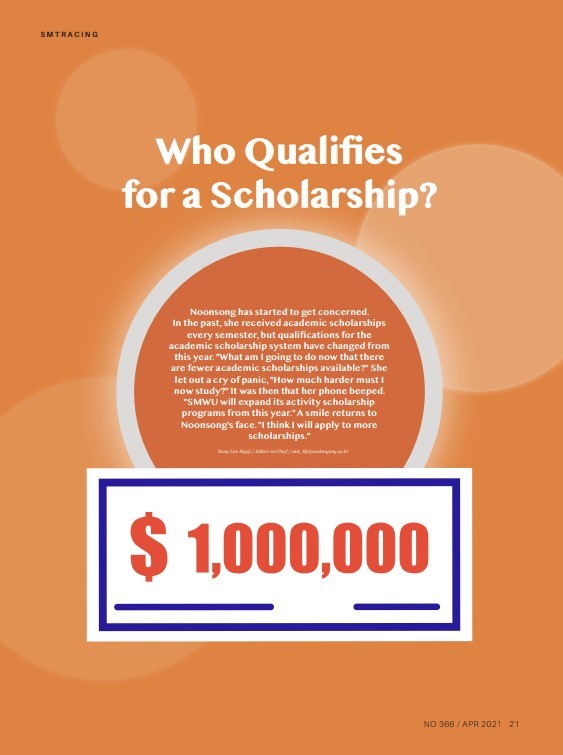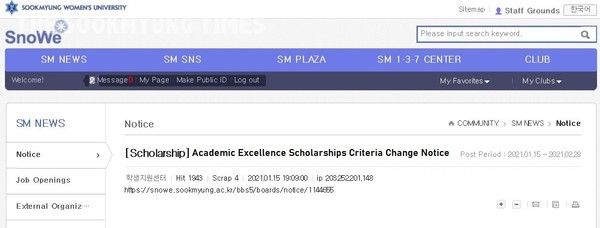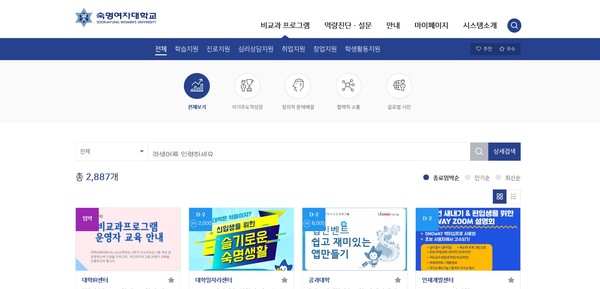
Noonsong has started to get concerned. In the past, she received academic scholarships every semester, but qualifications for the academic scholarship system have changed from this year. "What am I going to do now that there are fewer academic scholarships available?" She let out a cry of panic, "How much harder must I now study?" It was then that her phone beeped. "SMWU will expand its activity scholarship programs from this year." A smile returns to Noonsong's face. "I think I will apply to more scholarships."

Scholarships at SMWU
Sookmyung Women's University offers a variety of scholarships in different fields including scholarships for academic performance, volunteer activities, leadership group activities, and working scholars. Academic scholarships are easier to access than other scholarships because they have simpler requirements. The college summa cum laude and the department summa cum laude award scholarships of 100% of the tuition fee. Each department also offered 5%, 5%, and 15% of its total student body scholarships of 60%, 40%, and 20% of tuition fees, respectively. These are known as academic excellence scholarships 1, 2, and 3. These are given as a form of reduction in tuition fee. However, activity scholarships are given directly, not in the form of reduction in tuition fee. Because activity scholarships are also more accessible than other scholarships, many students are likely to be more interested in them. Any student who participates in activities such as Sookmyung leadership clubs or starts their own business qualifies for this scholarship. The activity scholarship is also available to students who participate in an international program on SNOWAY, a school website. Mileage points can be converted into scholarship money. Winners of public contests conducted by the College of Liberal Arts may also apply for a scholarship. Students who were put on academic probation the previous semester but who have participated in activities or done counseling or other study improvement programs may be awarded a scholarship once they have improved their grades.
On January 15, 2021, Sookmyung Women's University announced it would change the scholarship system on its website. The school planned to reduce the percentage of academic scholarships and increase activity scholarships. The ratio of college summa cum laude and the department summa cum laude scholarship fees would be the same as previous years, but the three types of academic excellence scholarships would be reduced. The planned reduction is from 5% to 2% for academic excellence scholarship 1, from 5% to 3% for academic excellence 2, from 15% to 5% for academic excellence 3. In addition, the percentage of tuition fee reduction would also decrease from 60% to 50% for level 1 and from 40% to 30% for level 2. Level 3 would remain the same. The point is, because the percentage of scholarships that are paid out each semester has been at a fixed rate of 19.4% of tuition fee income, the reduction of ratio in academic scholarships does not mean a reduction in total scholarship payments. The change was initially scheduled to take effect from the first semester of 2021, but the school emergency committee voiced opposition and postponement of the implementation, so the new scholarship regulations will come into effect from the second semester of 2021. However, the new regulations for activity scholarships take effect from the first semester of 2021, and the emergency committee has hosted an activity scholarship contest to hear students' opinions.

For whom?
The sudden changes to the scholarship system baffled most students. According to a survey conducted by The Sookmyung Times, 76 out of 92 respondents (82.6%) said they were dissatisfied with the revised scholarship system.1) Only about 17% of respondents said they were satisfied. As a reason, the half of the 17% said they could participate in various other student activities instead such as contests. They also mentioned that the revisions address the difficulty of evaluating students' learning due to online learning in the COVID-19 pandemic. Other reasons included the possibility of expanding support for low-income students. Those who expressed dissatisfaction claimed the reduced academic scholarships, which was claimed by about 96% of those. One participant in particular said, "In the past, academic scholarships were made available for students in 9 or 10 levels of income, but now that academic scholarship is no longer available. This does not benefit all students." In other words, students feel the new regulations do not treat all students fairly when it comes to academic scholarships. Another reason for students' dissatisfaction was the fear that students in some colleges and departments would be unable to take advantage of activity scholarships. Public contests that qualify for activity scholarships typically are centered only on students from a certain department, so students from other departments or career interests have no opportunity or are not motivated to partake in them. Moreover, there is concern for a lack of diversity in terms of public contests and international activities. Regarding this, one student said, "It is difficult to find an exhibition suitable for our department students. Before implementing the new scholarship regulations, the school should have expanded various activity programs within departments." In other words, implementation of the new scholarship rules needs input from students on their needs.
Respondents spoke of the changes they wanted to make to the scholarship. For a better scholarship system, one student said, "The number of students receiving a scholarship has decreased significantly. I would like the school to maintain the previous system." Others also voiced similar comments. "It is not appropriate to remove a scholarship opportunity for a next recipient, when a former scholarship recipient opts to refuse the scholarship." That is, the revised academic scholarship system will not help as many students as before and the ratio of recipients is reduced compared to prior years. Many respondents also voiced concern that the number of programs being open to students to earn scholarship money is small, so the school needs to quickly set up a variety of programs. One respondent said, "I would like the school to promote all scholarships as a whole instead of only putting up notices on SNOWAY. The school needs to announce all programs and content through SMART SOOKMYUNG. Also, when it comes to public programs, many of them are offered only in certain departments so it is hard to be of use for those of us not in those departments. I wonder if I would qualify for a scholarship if I were to join a program unrelated to my department. I hope that all public programs allow all students a chance to participate and that there are various activities offered in each department." This student clearly presents concerns mentioned earlier from survey results. Besides these concerns, some respondents said not only scholarships relate to income level, but other scholarships should also increase. Most scholarships in SMWU are offered to students with income up to level 8, so there are some students who are unable to benefit from a scholarship. Scholarships need to be expanded regardless of income level.

For us
Despite students expressing opposition, SMWU has moved forward with changes to its scholarship system for four reasons. First of all, the school claims it needs to update its scholarship system and move away from scholarship based on academic performance so that it provides equal educational opportunities for all Sookmyungians. To accomplish this, the school will expand its activity scholarships. Second, academic scholarship significance has decreased due to the expansion of absolute evaluation and relative evaluation. Most classes are now offered online due to the COVID-19 pandemic. Students demanded changes to the grading system once classes went online in 2020. Then, the number of students receiving an A increased from 34% to about 77%. As a result, there was concern among the school administrators that the criteria for receiving an academic performance scholarship award was weak. This year, the school set no limit on the number of students who may receive an A grade even with relative evaluation, and grading method is now based on achievement criteria set by the professor in charge. Therefore, to prevent calls claiming academic scholarship discrimination, the ratio of academic scholarships will be reduced, and activity scholarships will be expanded. In addition, the school maintains there has been demands for more activity scholarships among students. Finally, SMWU plans to better support low-income students using funds that would have otherwise gone to academic scholarships. In response, the emergency committee said, "For low-income students, SMWU offers them scholarships, funds for which are allocated as 22% of all scholarships provided by the registration fund. However, if 30% of the fund is allocated to scholarships payouts, the ratio of scholarships to low-income students must also increase." The emergency committee explained the reasons for the increase of support to low-income students, so the new scholarship system regulations do have strengths.
Changes to the scholarship system are expected to bring about various changes. First of all, support for low-income students will be expanded and they will have access to more scholarships. In addition, one participant mentioned about the positive impact of expanding activity scholarships saying, "The increase in activity scholarships will help promote external activities and increase talent nurtured by the school." She mentioned the positive impact expanding activity scholarships will have. In February, the emergency committee held an activity scholarship exhibition survey and promised to make every effort to host activity scholarship programs. In other words, changes to the scholarship system will have a clear change among students. However, negative effects are also inevitable. The survey respondent who pointed out the positive effects of scholarship regulation changes also pointed out, "The new changes could lead to overheated grade competition." Before the change, academic scholarships were available to a quarter of the entire student body, but now only one-tenth can receive a scholarship. Also, the amount of the scholarship has been reduced. These two changes will intensify competition among students. Scholarships for low-income students up to level 8 increased, but scholarships for students in income levels 9 and 10 decreased. Under these circumstances, the school needs to consider how its policy change will affect students.

Sookmyungians could get activity scholarships through these activity
For all Sookmyungians
SMWU changed its scholarship policy to better support Sookmyungians. Therefore, SMWU needs to fully understand students' wants and implement scholarships accordingly. Also, the school needs to consider how academic scholarship reductions, which will be implemented from next semester, will affect the student body and implement more activity scholarships that are open to all students.
1) The total number of students enrolled is 12,391, with a survey participation rate of about 1%


